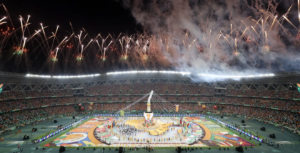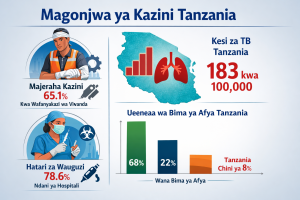
Half-Empty Stadiums in Ivory Coast, AFCON’s Crossroads of Movement, Inclusion, and Development
Pomp and Empty Stadia
Africa’s most prestigious sports competition, the African Cup of Nations (AFCON), currently in its 34th edition kicked off in Code d’Ivoire amid concerns around half-filled stadiums, a phenomenon that keeps on recurring. While the tournament is an excellent show of cultural diversity that characterizes the African continent, questions still linger on the integration of the continent into one entity keen on enhancing its people’s prosperity. Only 36,858 fans attended the opening game inside a 60,000-seat stadium characterizing the low turnout and attendance rates that have been witnessed at every edition of the tournament.
Africa is a football powerhouse considering the number of top players that have gone on to dominate top football leagues in the world winning coveted team and individual accolades. The quality of football, particularly in this year’s AFCON, is indicative of evolving standards with historical footballing giants such as Ghana falling to underdog Cape Verde. For pundits and football enthusiasts across the globe, the question of empty stadiums despite a diverse population of about 1.4 billion Africans still lingers.
Impassable Roads
One of the primary factors contributing to the low turnout at AFCON matches is the glaring infrastructure deficit across the continent. Inadequate road networks and transportation systems make it challenging for fans to travel to the stadium where, while passenger traffic on roads accounts for 90% of Africa, only 43% have access to all-season roads. A fully integrated Africa is therefore not possible without well-connected and reliable regional corridor infrastructure to easily complete the transportation value chain, increase access to economic opportunities, and take fans to stadiums whenever across the continent. While players such as the African Development Bank are keen on financing the construction of roads, enriching these networks within individual nations is necessary. Investing in state-of-the-art facilities and improving transportation infrastructure is crucial to creating a conducive environment for football enthusiasts.
Cross-Border Movement Restrictions
Cross-border movement challenges remain a significant impediment to attracting large crowds to AFCON matches. Stringent visa requirements, border restrictions, and inconsistent immigration policies hinder the free movement of fans between African nations. Notably, only Five countries, including Benin, Kenya, Rwanda, The Gambia, and Seychelles have made efforts to eliminate visa requirements for all African travelers. Of the nations, only 33 have extended visa-free entry to at least African countries across the continent.

With a visa still a requirement in 46% of travel scenarios across the continent, empty stadiums will continue to characterize the AFCON. The absence of a seamless cross-border movement system stifles the potential for fans from different countries to attend matches, limiting the tournament’s reach. Addressing these challenges is imperative to fostering a sense of unity and shared identity among African nations.
Steadying but Problematic Skies
The high cost of air travel within Africa is another significant barrier to large-scale attendance at sporting events. Skyrocketing airfares make it financially burdensome for fans to journey to host countries for AFCON matches. Flying across the continent is more expensive than anywhere else in the world with travelers paying higher ticket prices and more tax. Thus, it is often cheaper for an African to fly to another continent than to another African Nation. It costs between $500 and $850 to fly between Kinshasa in Congo and Nigeria’s Lagos compared to about $150 between Berlin and Istanbul.
This has made cross-border trade expensive for the elite with air transport across the continent accounting for only 2% globally despite the continent being home to 18% of the world’s population. Initiatives like the SAATM, which aims to liberalize air transport within the continent, can play a pivotal role in reducing travel costs. By fostering competition among airlines and promoting affordable airfares, the Single African Air Transport Market (SAATM) can make attending AFCON matches a more viable and attractive prospect for fans. Africa needs a coherent strategy in addressing issues that impact its air travel industry to transform, economies and make event attendance, such as the AFCON easier.
Rail Line Deficiencies
Railway transport is considered one of the cheapest and most reliable transport mechanisms across the globe. The absence of an extensive and efficient railway network further compounds the transportation challenges. Unlike other continents with well-established rail systems, Africa lags in this regard. The railway network in the continent is highly fragmented with the use of combined standards for track gauges, regulations, electrification systems, and other technical elements. Only 20% of rail projects in Africa are standard gauge (1,435 mm) with the rest being single-track and non-electrified.
Currently, Africa has only 8,500 Km of railway network operating 70% and accounting for only 8% of the world’s total length despite having 23% of the world’s surface and 18% of the population. The sector also faces significant historical challenges, including limited expertise, limited financial resources, political conditions, logistical challenges, and interoperability due to varying technical standards. Shockingly, 80% of freight and passenger transport through rail occurs in South Africa and the Northern African region. Introducing and improving connecting railways can enhance accessibility to stadiums, making it easier for fans to travel domestically and internationally for football events. Investment in railway infrastructure aligns with the broader goal of fostering economic integration and connectivity across the continent.
Opening Up Border for African Movement
There is a need for concerted efforts in strengthening and enhancing the implementation of the regional and continental trade blocs to support better cross-border movement across the continent. The establishment of regional blocs and the implementation of the AfCFTA mark significant steps toward African integration. These initiatives promote economic cooperation, trade, and the free movement of people. By eliminating trade barriers and harmonizing policies, the AfCFTA facilitates a conducive environment for sporting events. Furthermore, regional blocs create opportunities for shared infrastructure projects, such as cross-border highways and railways, fostering closer ties between nations.
The SAATM, The SAATM, designed to open up African skies, is a crucial component of the solution. By liberalizing air travel, the SAATM encourages competition among airlines, leading to reduced airfares. This, in turn, makes it more affordable for fans to attend international sporting events like AFCON.
The empty stadiums at AFCON are not a reflection of a lack of enthusiasm for football but rather a consequence of systemic challenges that hinder accessibility. Addressing the infrastructure deficit, cross-border movement challenges, expensive air transport, and the absence of connecting railways requires a concerted effort from African nations. Embracing initiatives like the SAATM, AfCFTA, and regional blocs can pave the way for a more integrated and prosperous Africa, where sports serve as a unifying force rather than an exclusive spectacle. It is time to unlock the full potential of the African Cup of Nations and transform it into a symbol of continental unity, celebration, and shared success.



